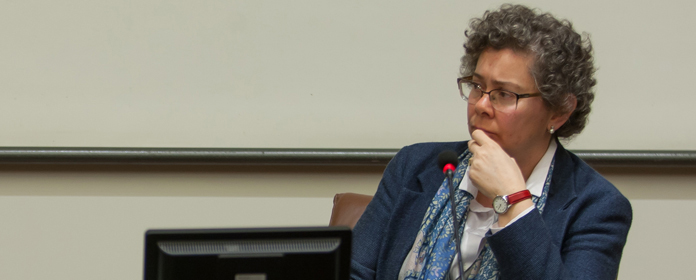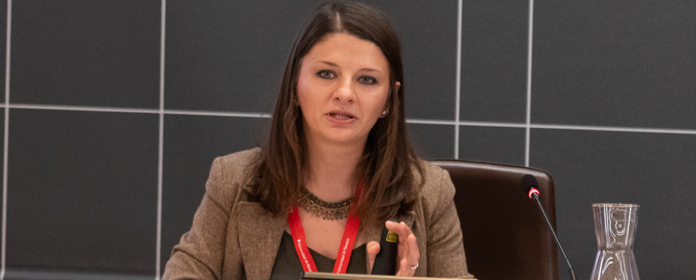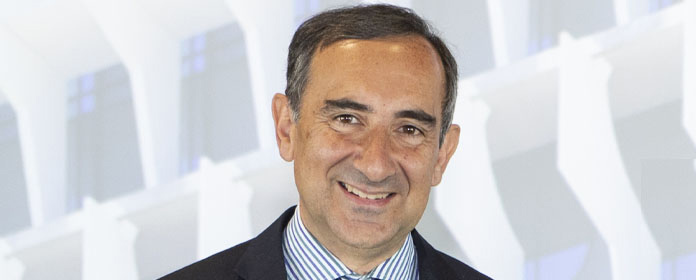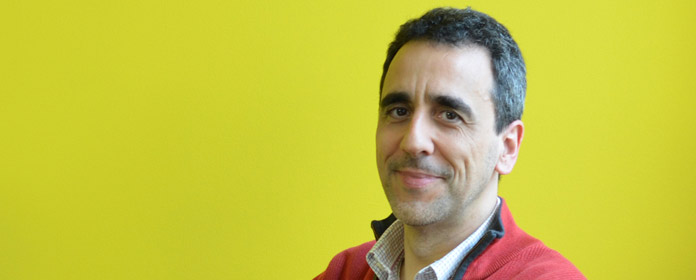COVID-19:A call to reflect on our social and development models
We interviewed Ana Marta González, ICS researcher and philosophy professor, to get her take on issues such as personal responsibility, the sustainability of our system and vulnerability in an aging Europe

FOTO: Manuel Castells
Ana Marta González is principal investigator of the Emotional Culture and Identity project at the Institute for Culture and Society (ICS) and professor within the Department of Philosophy at the University of Navarra. In relation to the current coronavirus crisis, she analyzes issues such as personal responsibility, sustainability and vulnerability in an aging Europe. She argues that this context challenges us to reflect on our social and development models, and creates an opportunity to find a new path.
The coronavirus has practically paralyzed our system as we knew it. Is it showing our system to be more fragile than we once thought?
It is not the first time that our social and operational habits have been suddenly affected by an event. We have a relatively recent example in the terrorist attacks of September 11 and, further back in time, the Second World War, which, among many other things, forced us to rethink the terms of production. At that time, women began to enter the world of work because men were out on the war front.
It is true that COVID-19 has altered what was our present normal, thus raising questions and prompting us to reflect not only on how we operate, but also on more existential questions. For example, to what extent does the way we live depend on social normality?
What changes can we already observe?
Some operational changes will possibly become new habits. For example, telework is now front and center, although not all labor sectors are in a position to adapt to it. Yet, this experience will undoubtedly catalyze us further in that direction.
It also forces us to think about the ambivalent meaning of globalization. On the one hand, globalization is based on communication technologies, which to a large extent are also helping us to cope with this crisis; on the other hand, the human mobility that furthers a globalized worldis also an accelerator of the pandemic. Here, a clear irony of fate has emerged in that the borders that we regrettably raised against immigrants, arguing that our health, labor and economic system cannot cope with their arrival, have been easily disrupted by a virus. A pandemic that is stressing our health system will force us to reform that system, which will hopefully bolster a more humane approach to development and globalization. Although our attention is currently and obviously focused on facing the crisis, the coronavirus is also asking us to look at our social and development models.
Where should we aim?
We have spent the last few years living at breakneck speed in all areas of life. For example, we travel around the world for gatherings where we could be virtually present. We must now examine why, when physical presence is not essential, we do not choose to stay at home in the first place, considering that technology provides solutions at our fingertips.
I happen to favor face-to-face classes and face-to-face communication, but perhaps some things should be reviewed in order to live more sustainably in both the economic and ecological senses.
But this is not new, right?
Things have been going in this direction for years; our way of life, the one we lead in the West and export everywhere else, is not sustainable. We must remember that people do not travel as easily or at the same speed as capital and goods. In fact, they present different conditions. In light of the pandemic, Donald Trump banned people, not merchandise, from the European Union [from entering the United States] for a month. The globalization of markets should not ignorethe asymmetry that exists between people and things, which is at the origin of many economic and social dysfunctions. The coronavirus crisis may represent a before and after in how we deal with the globalization of markets and communications. Interconnection does not in itself foster solidarity or humanity.
Is society prepared to take on this extraordinary situation and the flexibility it demands?
In one of his speeches, the President of the Government of Spain used an expression that has not gone unnoticed: “social discipline.” Those words are in opposition to what many media sources have reported in terms of people who, instead of staying at home as recommended by the authorities, have gone on vacation. Such behavior manifests a marked lack of congruence with what is happening on the social level. Although we are fortunately not at war, we are in a situation of social alarm, and we must know how to recognize and react to it as such.
In this sense, China, a non-democratic country, has more effectively controlledits citizens’ movements. Do human beings only obey when they coerced by threats from the authorities?
This type of situation tests our ability to act with personal responsibility and, to that extent, constitutes a benchmark for the moral health of democratic societies in which, ideally, we should be able to act responsibly without having to resort to coercive measures. So it seems important to me to evaluate my own attitude in order to ensure that I am not endangering vulnerable people. This reveals the extent to which a person lives in a shared world or, conversely, in his own world. It is a good time to look at the extent to which concepts like solidarity have real meaning in our lives. Healthcare personnel are responding with the highest level of dedication, which must be matched by a responsible attitude on the part of the population so that the healthcare system does not collapse.
What can we learn from the dedication of healthcare professionals in face of this pandemic?
One of the most noteworthy elements of this crisisis the care that healthcare personnel are providing to the sick, and the discipline and dedication with which they are carrying out their work. This also gives us food for thought—machines cannot do jobs that include a strong relational element, which requires discernment and creativity. We value efficiency and productivity, which machines can deliver on, but human society rests on other values as well. Perhaps we must think of a social model that does not rest so exclusively on a vision of work modeled on productivity, and that instead incorporates other human elements such as creativity, the ability to form bonds, etc. I understand that right now our priorities are elsewhere, but I cannot help but think that this situation is also an invitation to think about a social model that reflects the crucial importance of these jobs, whose value is not effectively measured with money, and that instead augmenta sense of identity and solidarity. In short, we must realize that there is a currency in circulation that has nothing to do with actual money, and we must promote a social model that pivots on the more specifically human elements of work.
The merit of healthcare professionals contrasts with our political leaders’ inability to generate calm, credibility, confidence... What role should they play in this crisis?
Respect for healthcare professionals and their work is unquestionable and the population’s confidence in their work must be made public. But their work must be supported by sound political decisions. Policy makers are trying to strike a difficult balance between health and the economy since everything seems to indicate that the latter will be greatly impacted. With our economic operating patterns, such a situation will generate a major crisis.
Politicians are devalued in the eyes of public opinion, but this is nothing new. Somehow, each crisis that arises is one more point in favor of this devalued perception. Our leaders do not set the tone, and rather generally observe social trends and thentry to get ahead of them. It is certainly not easy to govern complexity, and it is easier to criticize decisions than to make them. Either way, gathering the courage to make the right decisions at the right time involves discerning what, in fact, is the right time. And this, in turn, requires having clear priorities and relying on the opinion of experts on the issues most directly concerned here, namely the health sector and the economy.
Finally, do you think that our capacity for resilience will both see us through this situation and also help us generate constructive reflection on our future?
External events can stimulate reflection, but only when a person has a certain disposition. Ludwig Wittgenstein wrote his philosophical views in the middle of a world war, with the world collapsing around him. At present, many people have abandoned themselves to last minute updates on social networks; this state of permanent distraction does not encourage reflection. As I said before, if your way of life depends on a social normality that includes shopping, bars, excursions, etc. what is left for you when those options are unavailable?
In this respect and from a psychological point of view, Europe is very vulnerable. Although we have experienced the effects of recent conflicts such as the Balkan Wars or the migration crisis, no situation of this magnitude and extent has impacted us since the Second World War. Many parts of the world routinely face situations of emergency and violence. At this point, in the middle of the pandemic, we must ensure that the system does not collapse. Our next challenge will be to return to a state of new normality, and hopefully we will do so with a little more wisdom.
In one sense, the coronavirus pandemic is an unexpected crossroads, giving us the opportunity to stop and reflect on the personal and social habits that we could change, that we should change, and that would make the world a little more humane.




